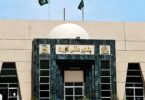ISLAMABAD (APP): Federal Minister for Finance and Revenue Shaukat Tarin Saturday said the main focus of the inclusive growth-oriented federal budget for the fiscal year 2021-22 was to uplift the poor so that they would not have to wait for trickle-down effect of economic progress.
The low-income people had been waiting for that for the last 74 years, as they remained deprived of houses, health facilities and business opportunities, he said while addressing the post-budget press conference.
The government, he said, was now directly targeting the poorest of the poor and facilitating them with different initiatives to upgrade their living standards without waiting for trickle-down effect, and for that around 20 years of stable economic growth was required.
The minister said it was not an easy task, however, he was thankful to Almighty Allah for giving the incumbent government the vision to work for the poor.
The government, he said, through the budget would utilize the ‘bottom-up-approach’ for improving the living conditions of around 6 million low-income households.
He said under the initiative, every household would be provided Rs 500,000 interest-free business loan. Every farming household would be given interest free loan of Rs 150,000 loan for every crop, interest fee farming loan of Rs 250,000 and interest free loan of Rs 200,000 for buying tractor and agricultural implements.
Tarin said low-interest bearing housing loans of up to Rs 2 million would be provided to help the people buy houses, besides Sehat Card to every household to facilitate them in time of need.
Moreover, one person from every household would be imparted free technical training to ensure employability so that the family earned respectable income, he added. The government, he said, did not have room to provide all such loans. The commercial banks would be involved, which would provide wholesale financing, while government would be providing guarantees for loan recovery.
The minister said the identification of the poorest households would be done through a non-political survey all across the country. “We will not play politics with the poor,” he added.
Tarin said after achieving economic stability, the government was following a comprehensive strategy to lead the country towards sustainable growth. The government’s primary focus in that regard, he said, was to promote exports and take their volume from 8 percent at present to 20 percent of the Gross Domestic Product (GDP). There was dire need to enhance exports for economic sustainability, he stressed.
The minister said for the first time, a growth-oriented budget was presented, including innovative measures to enhance revenue collection, expansion of incentives for exporters and abolishing duty on local industry, including automobile sector.
The finance minster said a team of renowned economists headed by Dr Ishrat Hussain was set up for identifying bottlenecks that hindered the economic development, besides suggesting measures to overcome the challenges to achieve sustainable growth. He said the economists suggested to increase savings and revenue collection, emphasize on producing imports substitute and encourage exports by incentivizing local trade and businesses, besides focusing on the agriculture sector to reduce reliance on imported foodstuff.
The minister said savings were imperative for creating room for investment. Pakistan’s savings-GDP ratio, he said, was lower than other developing countries, and the government had proposed special measures in the current budget to promote savings. Besides, he said, revenue collection was the second important tool to maintain sustainable growth. Local annual revenue started receding after witnessing 11 to 12 percent growth, which resulted in the availability of less resources for the social sector development.
The minister said in order to create resources for fulfilling development requirements as well as to maintain sustainable growth, annual growth of revenue was required to grow by 20 percent. Efforts were afoot to increase the revenue at that level within seven to eight years to create abundant resources for the development work.
To meet the future development expenditures, he said, the government had set a challenging target of revenue collection of over Rs 5.8 trillion against Rs 4.7 trillion for the current financial year. Tarin said in order to achieve the realistically aggressive revenue targets of Rs 5.8 trillion set for fiscal year 2021-22, innovative ways and means would be used without overburdening the existing tax payers and introducing incentives for consumers.
He said the Federal Board of Revenue (FBR) had also started data collection for identifying the potential tax payers, who were eligible to pay tax but were out of the tax net so far. The measure was expected to bring about 312,000 potential tax payers under the tax net, he added.
Morever, he said, some 10,000 Points of Sale (PoS) were currently under use and their number would be enhanced by bringing 60,000 more business establishments under the system Train said in order to strengthen the PoS system, incentives and prize schemes would be announced for the general consumers that would help in documentation of the economy. Revenue collection of about Rs 100 to150 billion was expected through the PoS system, he added.
He said for bringing different industries under the tax net, the scope of track and trace system would be expanded, which would not only help enhance the revenue collection, but also promote the tax compliance culture in the country.
The minister said the government was keen to develop the agriculture sector as it would help check the rising inflation. Special measures were announced in the budget for the uplift of sector.
The government in its current budget, he said, had also suggested steps to promote exports that would help reduce pressure on the foreign exchange reserves, besides developing the local industrial sector.
The Special Economic Zones being set up under the China-Pakistan Economic Corridor would also help in local industrial development and create job opportunities for the skilled and semi-skilled work force, he added. Special tax relief was suggested on the import of plant and machinery that would also help in attracting the foreign investment, the minister said.






